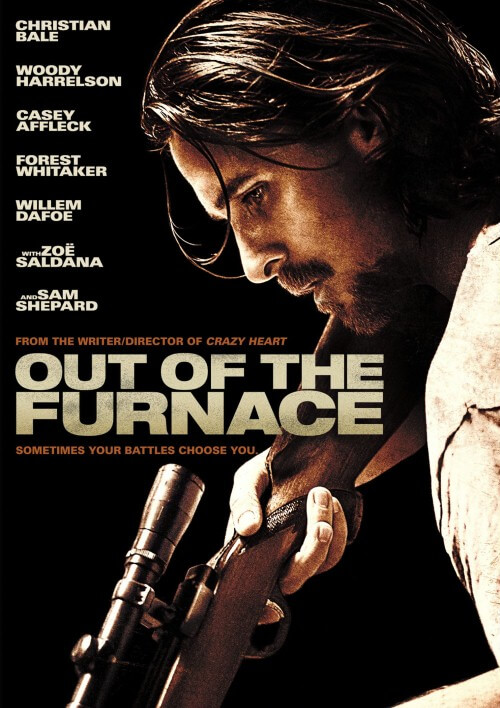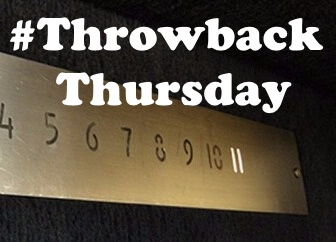Eleventh Stack began publishing content in 2008. That’s nine years of awesome content! We’re highlighting some of our old favorites for Throwback Thursday. The post “’Burgh on Film: Out of the Furnace” originally appeared on April 10, 2014.
Pittsburgh has a long history with film, and Scott Cooper’s Out of the Furnace is a welcome, breathtaking addition to the tradition.
The movie, which has no relation to Thomas Bell’s Out of This Furnace, opens at a drive-in movie theater. The image projected on the screen is that of a well-dressed businessman, ascending an escalator. As he rises, the camera pans down into the field of parked cars. This particular scene didn’t stick out for me the first time I saw it, but–re-watching it recently–I found it striking. Drive-in movie theaters have all but disappeared–time capsules from a bygone era. The camera’s descent into this relic, juxtaposed with the ascent of a sharp-dressed businessman exemplifies, to me, one of the many themes of the movie: the times are changing, out with the old and in with the new. I find it interesting that it’s at this intersection that we’re introduced to Harlan DeGroat, the movie’s meth-head villain, menacingly played by Woody Harrelson. An angry, frothing evil practically bleeds out of his eyes. He’s not a villain you love to hate; he’s a villain you hate with a passion and hope he gets his comeuppance.
Beyond the theme of change, the central theme is that of choice. The movie’s tagline, “Sometimes your battles choose you” is characterized through the struggles of mill worker Russell Baze, phenomenally played by Christian Bale. A good, decent man by all accounts, we struggle along with him throughout the entire movie as he is constantly put into trying situations. How far will he go to help his brother, Rodney, fresh from his fourth tour in Iraq and played with subtlety by Casey Affleck, get out of debt? How will he be able to care for his ailing father? How is he going to live if the mill he works at does, in fact, close? Bale’s character even says it’s cheaper to get steel from China, as if admitting that is tantamount to him succumbing to the forces he so desperately tries to control.
There’s really nothing new about the narrative here, but the actors infuse such realism into their scenes that, even if Cooper doesn’t use them to their full potential, you have to take notice of what’s unfolding before you, despite the slow-moving pace of the film.
And that’s one of the reasons why I love this film.

These characters seem natural, organic, born from the blast furnaces that forged our city. There isn’t a false note in anyone’s performance. Even relative newcomer Zoë Saldana holds her own against a heavyweight like Bale. And speaking of Bale, he might as well be giving a masters class on acting in this film. It baffles me that he got his Oscar nomination for American Hustle instead of this. He has a scene on a bridge with Saldana, barely four minutes long, that is better acted than most of American Hustle’s entire runtime. The scene is so real, bubbling over with palpable emotion, you almost feel like a voyeur watching them.
Bale looks so much like a genuine Pittsburgh mill worker, hardworking and worn, that I’ll forgive him for not having a typical yinzer accent. Despite that, he embodies Pittsburgh, complete with Braddock’s zip code tattooed on his neck. He even goes hunting with his uncle, played by Sam Shepard. He wouldn’t look at all out of place at a bar like Jack’s or Dee’s on the Southside.
And speaking of Pittsburgh landmarks, the second reason I love this movie is because there’s so much about it that makes it genuinely feel like Pittsburgh. I love seeing Pittsburgh on film. Maybe it’s the fact that I’m seeing the places I’ve been and the streets I’ve walked projected onto a twenty-two-foot screen in a darkened theatre. It makes the city seem monumental, almost mythical. Maybe every New Yorker feels this exhilaration upon exiting the theatre. Maybe that’s why they call it movie magic.
It’s not just the scenery—beautifully shot on Kodak film as opposed to captured digitally—that makes the film feel authentically Pittsburgh. Honestly, Braddock has never looked better and during the film’s climax, the Carrie Blast Furnace almost outperforms Bale and Harrelson with its grandness.
It’s not just the music, which features songs by Eddie Vedder. I don’t even care for Vedder’s music and I must admit that putting it on top of scenes of Braddock works splendidly.
It’s something else.
There’s something so honest about seeing the cracked streets, boarded up houses and laboring smokestacks of Braddock on-screen, alongside a movie that is so much about perseverance despite obstacles. Pittsburgh is no longer “hell with the lid taken off.” Even the fish have returned to our rivers (I still wouldn’t swim in them, though). Pittsburgh has pulled itself up out of the furnace and taken matters into its own hands, just like Bale ultimately does in the end. It’s almost as if Cooper captured the driven character of Pittsburgh.
Also starring Willem Dafoe and Forest Whitaker, Out of the Furnace is a slow-burning revenge film that has stayed with me since I first saw it in the fall of 2013. I’d liken its tone to another one of my favorite films of that year— Denis Villeneuve’s Prisoners . I get the urge to watch Prisoners every time it rains, which—as a result of living in Pittsburgh—is roughly three hundred times a year (I realize this probably says more about me than any psychiatric test could, but I digress). I feel like I could always watch Out of the Furnace, though. Despite its somber tone and deliberate pace, there’s an underlying steadfast hopefulness about the whole thing.
When we lose everything, we fear nothing and that spurs us on to take action.
One of Pittsburgh’s best movies
Click here to reserve Out of the FurnaceRoss used to work as a Clerk at the Mt. Washington branch of the Carnegie Library of Pittsburgh. He still loves reading books and watching movies, but won’t be rambling about the two as often here anymore.

